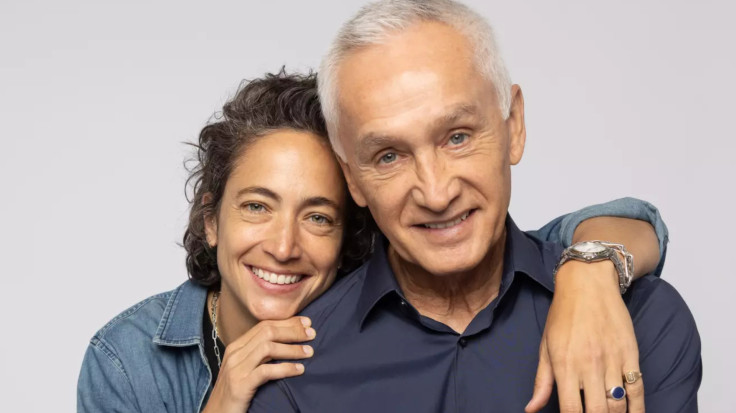
When New York Assembly member Zohran Mamdani finally decided to speak publicly about Venezuela's Nicolás Maduro and Cuban leader Miguel Díaz-Canel, he didn't do it in a press conference or a statement through his office but on a podcast. He was being interviewed by none other than Emmy Award-winning journalist Jorge Ramos and his daughter, political commentator Paola Ramos.
In "The Moment," a brand-new podcast from iHeartMedia's My Cultura and Radio Ambulante Studios, the father-daughter duo secured the New York City mayoral candidate's most candid remarks to date about Latin America's most controversial leaders.
The conversation marks a breakthrough moment not just for Mamdani, whose silence on Venezuela and Cuba had become increasingly conspicuous, but also for Jorge and Paola, who are building a space where politics, identity, and hard questions collide. Two Latino journalists making history when it matters the most for the community.
"We decided to do the podcast in English in part because it's very, very important for us to almost insert ourselves in a space that typically doesn't have voices like ours," explains Paola during a video call with The Latin Times. She was in her home in Brooklyn. Jorge in his home office in Miami, which has become as familiar to his online audience as the studio of Univision Noticias he commanded for over three decades.
The Breakthrough Moment
Mamdani, the Democratic mayoral nominee and leading candidate in the race for New York City Hall, has often spoken about housing rights and immigrant justice but stayed cautious when asked about Maduro's authoritarian rule or Díaz-Canel's repression in Cuba. During the interview, the duo pressed him on whether he considered them dictators. The initial answer was mild, condemning the repression in both countries but declining to call them "dictators." However, his campaign sent a much more contundent position days after the interview:
" I want to be clear on where I stand. I believe both Nicolas Maduro and Miguel Diaz-Canel are dictators. Their administrations have stifled free and fair elections, jailed political opponents, and suppressed the free and fair press. And yet, our federal government's long history of punitive policies toward both countries, including extrajudicial killings of Venezuelans and the continuation of a decades long blockade of Cuba, have only worsened these conditions. Democratic socialism is about dignity, justice and accountability. And above all, it's about building a democracy that works for working people, not one that preys on them."
Jorge, who pressured him for a concrete answer, explained that for him the question is what he calls "el bautizo de Miami," (The Miami Baptism).
"When whoever arrives in Miami immediately, you ask, 'So, before, was Fidel a dictator?' 'Is Raúl a dictator? Is Díaz-Canel a dictator? And then, in the case of Venezuela, it is exactly the same. Do you think so? Hugo Chávez was a dictator. Do you think that? Nicolás Maduro is a dictator, and then by asking that question, the communities immediately can position you and say you are with us or you are not with us. So for me. It's been a very natural immediately to ask everyone about that. And I think it says a lot about what you think about democracy," he added.
Jorge and Paola Ramos: Two Generations, One Mission
The podcast itself has quickly drawn attention because it brings together two distinct generations of journalists. Jorge Ramos, Univision's veteran anchor, is known for his relentless confrontations with presidents from Donald Trump to Hugo Chávez. Paola Ramos, a former White House staffer and MSNBC contributor, has carved out her own voice as a chronicler of Latino identity, queer issues, and generational change. Both are acomplished authors.
Together, they bring different instincts: Jorge with the sharp, prosecutorial style of decades in broadcast news, and Paola with the cultural fluency and nuanced approach of a millennial raised in bilingual spaces. Their back-and-forth keeps guests from settling into rehearsed answers.
Beyond the Headlines
The Mamdani interview is part of a larger season where the Ramoses will explore themes of democracy, exile, and identity. The second episode is with The goal, Jorge Ramos says, is to capture history in the making while forcing public figures to drop their guards.
The second episode is with Anthony Romero, the longest-serving executive director of the American Civil Liberties Union. Their compelling conversation went from free speech and the new McCarthyism, ICE detentions, and the fight to protect birthright citizenship to the cultural influence of Bad Bunny.
And that's only the beginning. "We're going to do 45 podcasts within a year, and we've been very happy and very lucky to get almost every one we wanted. We have already taped six. And then in a couple of weeks, we're going to tape another five or six," said Jorge. As if that goal wasn't ambitious enough, he added, "At some point. We want to be able to react to breaking news."
"We also want to talk to artists and thinkers," expressed Paola. Their aim is pointed towards "anyone that has any type of influence, and it's moving the needle...including people within the Trump administration." They mention Trump's border czar. Tom Homan and Stephen Miller, the White House's Deputy Chief of Staff for Policy and Homeland Security Advisor, considered the architect and implementer of the administration's agenda, particularly its hardline stance on immigration.
"We need all the voices for a healthy debate," she said.
With Mamdani, they succeeded. For the first time, a politician who had carefully avoided talking about Maduro and Díaz-Canel spoke openly about the risks of repression and the meaning of silence. It was a scoop that only Jorge and Paola Ramos, combining credibility and generational reach, could deliver.
You can watch the full interview here.
© 2025 Latin Times. All rights reserved. Do not reproduce without permission.




